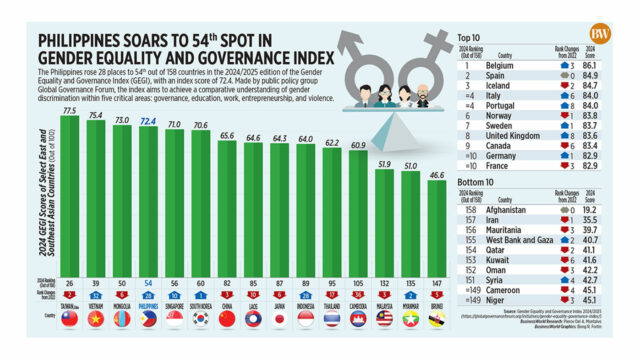By Chloe Mari A. Hufana, Reporter
THE ADOPTION of artificial intelligence (AI) in the Philippines’ business process outsourcing (BPO) and business process management sectors is still in early stages as managements show reluctance to upskill workers, leaving them more vulnerable to job insecurity.
This prompted labor groups to sound alarms over insufficient legislative safeguards for workers, calling on Congress to implement measures that ensure job security and provide upskilling opportunities.
“Right now, AI isn’t yet disruptive [in the sector],” Emmanuel D. David, co-convener of the Alliance of Call Center Workers (ACW), said in a videoconferencing call with BusinessWorld, highlighting growing apprehensions about AIs potential to disrupt job security.
Mr. David noted current AI tools used in the industry include call monitoring systems and a summarizer that automates the documentation of interaction. Despite these advancements, he said workers’ workloads have not decreased as much as anticipated.
 “Ideally, what’s going to happen is we no longer need to document our calls. We just copy-paste and that’s it. Because, of course, documenting calls still takes time.”
“Ideally, what’s going to happen is we no longer need to document our calls. We just copy-paste and that’s it. Because, of course, documenting calls still takes time.”
“But the thing is, since the call summarizer is not yet optimized, management doesn’t want us to copy-paste yet. They still want us to make our own notes. So, there’s something contradictory there.”
He said that while AI tools are continuously emerging, companies are falling short in helping workers prepare and adapt for AI integration. As the industry is fast-paced, management does not often pull workers out for training, “unless it’s really important.”
“Since it’s an industry that focuses on the productivity of workers, they usually do not pull us out because they want us on the phone taking in calls,” he noted, leaving workers unprepared to adapt to evolving technologies.
Upskilling workers amid the AI age has been declining over the years as companies train their workers on new technology less and less, Mr. David said.
“I’ve noticed the changes [that] previously they used to regularly pull agents out for training, for updates. But as the years go by, these happen less and less because the focus is on taking in more calls, which means more money for the company,” he added.
Ronald C. dela Cruz, the national president of the Congress of Independent Organizations, said companies do not talk about transitioning to AI but its effects are felt as seen in the case of a BPO firm based in Bacolod, a southern province in the Philippines, which downsized the company by firing 120 workers as AI takes over their job.
“Management doesn’t talk about AI. They don’t really say that they will transition into AI. It is not discussed, but it can be felt,” he told BusinessWorld in a telephone call, noting the main reason for this is they don’t want to portray themselves as promoting AI at the expense of human work.
BRING YOUR OWN AI
As an effort to adapt to the rise of AI, workers are enrolling themselves in AI training courses and bootcamps. Instead of their management helping them transition, these workers pay for their own training from their own pockets.
“We believe that AI and humans can work hand in hand. AI should increase the efficiency of what humans do. But it should not replace humans,” he added.
There are 2,205 firms in the country comprising the industry, according to the Philippine Statistics Authority’s (PSA) 2021 Annual Survey of Philippine Business and Industry – Information Technology – Business Process Management (IT-BPM) Industries published on Nov. 21, 2023.
Approximately 849,000 individuals are employed in the sector, with each company averaging about 385 employees. These workers earn an estimated annual income of P440,000.
PSA data showed the companies make about P848 billion in annual revenue, while sales in e-commerce transactions made over P23 billion. Total revenues made from transactions outside the Philippines reached over P314 billion.
PSA defined BPO as the “delegation of one or more Information Technology-intensive business processes to an external provider that, in turn, owns, administers, and manages the selected process or processes based on defined and measurable performance metrics.”
While IT-BPM services, in general, refer to the provision of a bundled service package that combines information technology-intensive services with labor (manual or professional depending on the solution).
In June, Labor Secretary Bienvenido E. Laguesma admitted Filipino workers have been losing jobs since the boom of AI. He said the Department of Labor and Employment and other stakeholders are working on initiatives to prepare workers.
Despite the job losses, the labor chief noted AI also presents new job opportunities, such as data curation.
The 2024 Work Trend Index, jointly released by Microsoft and LinkedIn in May 2024, underscored the growing integration of AI into workplaces and its implications for workers and employers globally, including in the Philippines. According to the study, AI proficiency is becoming a decisive factor in hiring decisions, with a marked increase in professionals globally adding AI-related skills like ChatGPT and Copilot to their profiles. Despite this, only a small fraction of employees receives formal AI training, prompting many to upskill independently.
Employees are increasingly adopting AI tools, even without organizational support, a phenomenon dubbed the “bring your own AI” trend. While AI power users — those extensively using AI at work — report significant time savings and improved productivity, businesses face challenges in developing cohesive strategies for AI adoption.
Microsoft and LinkedIn stressed the importance of structured AI integration and training to address concerns about job displacement and skill gaps. The findings highlighted the need for companies and governments to invest in AI training programs, align workforce strategies, and foster a culture of innovation to remain competitive in an AI-driven future.
FUTURE-PROOFING WORKERS
As industry workers worry about possible job loss due to AI, Mr. Dela Cruz urged the legislature to pass measures to strengthen job security amid AI’s speedy rise, specifically forging a just and humane transition.
“It’s very important to have a legal framework because right now, only organized workers, workers with unions and collective bargaining can influence policies to address the influx of AI in the world,” he said, noting that there are no organized groups in the industry.
Despite the lack of specific legislation protecting workers from AI-driven job loss, Mr. Dela Cruz said Article 238 of the 1974 Philippine Labor Code still serves as a safety net for them, albeit outdated.
“Employers may terminate an employee due to the installation of labor-saving devices… to prevent losses or the closing… of operation,” the provision read, as Mr. Dela Cruz cited.
Mr. Dela Cruz, who has been working with industry workers since 2014, called the rise of AI the fourth industrial revolution that cannot be stopped.
“Congress should step in because if it is not written by law, management would still do what is convenient for them economically and operationally.”
Meanwhile, for Mr. David, the government should invest in training programs to equip workers with the necessary skills and knowledge to adapt to the changes brought about by the rise of AI.
“If at the end of the day, AI is going to take over our jobs, the government should do a massive training program so that the workers, not just in the business processing industry, would have the skills in order for them to keep their jobs even with AI,” he said.
He noted the government must also equip students with AI knowledge before they enter the workforce by adjusting educational curricula.
The rise of artificial intelligence in the business processing industry is not just a technological evolution — it is a call to action. It challenges stakeholders to reimagine the workplace, where humans and AI collaborate rather than compete. For this vision to flourish, Congress must lay the groundwork for a future where workers are protected, empowered and prepared to thrive alongside these innovations.
With bold policies, dynamic training programs, and an education system that embraces the AI era, the Philippines can transform uncertainty into opportunity. The story of AI in the business processing industry is still being written, and with thoughtful leadership, it can become one of resilience, growth, and shared success.












 “Ideally, what’s going to happen is we no longer need to document our calls. We just copy-paste and that’s it. Because, of course, documenting calls still takes time.”
“Ideally, what’s going to happen is we no longer need to document our calls. We just copy-paste and that’s it. Because, of course, documenting calls still takes time.” 
